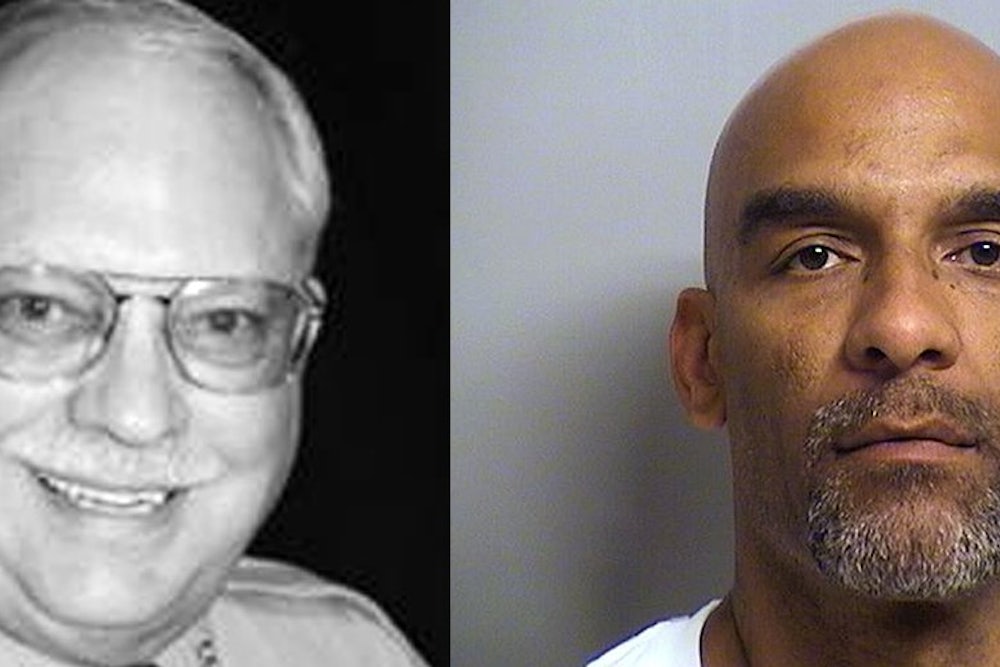The police killing of Eric Courtney Harris, who was shot to death in Tulsa by a 73-year-old “reserve deputy” who had meant to tase him, raises several baffling questions. Why was Robert Bates, an elderly insurance executive who served one year as a police officer back in the 1960s, involved in a dangerous sting operation? Why are amateurs apparently allowed to buy their way into the Tulsa force? Why was this pseudo-deputy allowed to carry a gun? And how could he confuse it with a Taser?
To be sure, these questions require answers. But the video of the killing, which was recorded by an officer's body camera, raises an equally important question that applies to a number of high-profile police killings of late: Why didn't the cops help Harris after he was shot?
In the video, Harris is shown talking to police about the gun sale they've arranged. When he realizes that he's being ambushed, Harris runs, and from the officer’s body-cam we see him taken to the ground. Bates announces he is going to tase Harris. We hear a gunshot, and then Bates, realizing that he has just executed an unarmed man, apologizes: “Oh, I shot him. I’m sorry.”
Harris is incredulous. “He shot me!” he says. “Oh my God!” But the officers, instead of suddenly springing into action to help the dying man, begin to swear at him. “You fucking ran!" shouts a cop. "Shut the fuck up!” Harris moans that he is losing his breath, to which an officer replies: “Fuck your breath.”
“Fuck your breath” is a telling reply to the “I Can’t Breathe” slogan adopted in the wake of Eric Garner’s chokehold killing by a New York cop. It reflects a hideous indifference to lives wrongly taken, and it’s not just a lone officer in Tulsa: after the Garner protests, NYPD officers counter-protested with “I can breathe” hoodies.
That indifference is reflected not just in their words, but their actions. In several recent videos of police killings, officers fail to provide medical attention to the victims they've wounded. Instead of switching from crime-stoppers to caregivers the moment a suspect is injured and harmless, as any compassionate human being would do, officers often either berate the suspect or stand idly by as the victim dies.
After Cleveland police officers shot 12-year-old Tamir Rice, they spent their time handcuffing his terrified sister. (This type of neglect is apparently not uncommon for Cleveland police; they have been the subject of dozens of civilian complaints for instances in which they made injuries worse or refused to let the injured go to hospitals.) The Garner video drags on for minutes after his final “I can't breathe,” the officers standing around while Garner lies motionless on the ground. And Michael Slager, the South Carolina officer who shot Walter Scott in the back, handcuffs the dying man instead of trying to help him.
There may be a temptation to blame these incidents on rogue or incompetent police officers. After Slager was charged with murder, the North Charleston police union said it wouldn’t tolerate officers who “tarnish the badge,” and Mayor Keith Summey said, “When you’re wrong, you’re wrong. And if you make a bad decision, don’t care if you’re behind the shield or just a citizen on the street, you have to live by that decision.”
But the more of these videos that emerge, the less believable the rogue theory becomes. After all, consider the behavior of the actual cops surrounding Robert Bates, the Tulsa reserve deputy, after his fatal mistake. He's facing a manslaughter charge, and surely he deserves to be punished. What his colleagues did, though, was far more cold and intentional. Those who shoot the unarmed may be negligent killers or murderers, but those who stand idly by while the victims die might as well be accessories after the fact.
